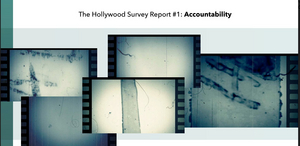Anita Hill-Led Hollywood Commission Releases Landmark Survey on Harassment
The first report from the first-of-its kind, industry-wide worker survey.

The Hollywood Commission, chaired by Anita Hill and founded by Kathleen Kennedy and Nina Shaw, today released the first report from the first-of-its kind, industry-wide worker survey. The results focus on the lack of perceived accountability for sexual misconduct across the entertainment industry and the need for tools, resources and systems to respond to workers' long-unaddressed concerns. The national, anonymous survey was conducted online over a three-month period (Nov. 2019 - Feb. 2020). A total of 9,630 people who self identified that they were currently working, pursuing work, or had previously worked in the entertainment industry responded to the survey. Results and reports on bias, bullying, and progress since #MeToo with sexual harassment and assault will be made available in October.
"For too long in Hollywood, there have been 'open secrets' about the harassment perpetrated on workers by powerful people who are able to successfully evade accountability for their actions," said Anita Hill, Chair, The Hollywood Commission for Eliminating Harassment and Advancing Equality. "With this survey, we have identified the most vulnerable workers in Hollywood and the resources and systems that will provide support and a safety net for them. Our expectation is that these tools will be the foundation to build a new era of transparency and accountability for all workers in the entertainment industry."
Key Findings on Accountability
-
Dim view of accountability: Workers DON'T believe those in positions of power will be held to account for harassment. Those who are in traditionally underrepresented groups had even dimmer views of accountability. In terms of gender, there is a sizable gap between men's and women's views on accountability. Forty-five percent of men believe someone in power would be held accountable for harassing someone with less authority versus 28% of females. White and Black or African American workers had the most favorable view of accountability (36% and 34% respectively). Workers who identified as of Hispanic, Latino or Spanish origin, 29% had a favorable view of accountability. Among females, only 29% of White women and 27% of Black or African American women had a favorable view of accountability, compared to 46% of White men and 50% of Black or African American men had a favorable view of the same.
-
Power abuse: Power inequities perpetuate the lack of accountability. Less than half (48%) of workers saw progress in addressing power abuse since the MeToo resurgence in October 2017. The primary offenders in Hollywood are in powerful positions to influence who gets hired (55%) and who gets to keep a job (59%), and to damage the reputations of those who complain about abuse (59%).
-
Reporting: One of the biggest challenges to accountability is trust - and victims and witnesses in entertainment are remaining silent. Few victims of sexually harassing behaviors shared their experiences with a supervisor (23%), HUMAN RESOURCES (9%), or legal department (4%). Workers who experience sexual coercion DON'T report predominantly because they do not believe anything will be done.
-
Retaliation: Witnesses were reticent to report and said that they didn't believe any action would be taken and were even more fearful of retaliation than victims. This fear of retaliation is not unfounded, with about two-fifths (41%) of survey respondents reporting that they experienced some type of retaliatory behavior.
-
Requested Accountability Resources: When asked which of the following resources would be most helpful to them, workers asked for the following: technology for victims to create a time-stamped record (93%), a helpline/hotline (94%), resources to help workers understand reporting options (95%), bystander intervention training (91%), and consistent standardized and definitions for prohibited behavior (92%).
Based on the survey data and participants' narrative responses, the Hollywood Commission is launching the following resources:
Repeat offender platform: Multiple complaints about the same person are frequent. Research tells us that if someone acts in an abusive, aggressive way, they are likely to do so more than once. The Commission gathered individuals throughout the industry to review technology that allows repeat offender identification and was tailored to the entertainment industry. The new platform will launch in beta in Q1 2021, with participating organizations announced at a later date. The platform gives workers who feel they have experienced sexual misconduct, discrimination, harassment, bullying or microaggressions the ability to share it anonymously. Workers may choose to report immediately or to file a conditional report. If a worker makes a conditional report, if (and only if) other people in the organization also file complaints about the same aggressor, they will be notified and can decide whether to release their identity and participate in an investigation. Other components of the platform include two-way anonymous messaging, which workers can use to raise any concern and ask questions about process and instructions on how to create a time-stamped record.
Bystander intervention training: Many respondents who reported experiencing an incident of workplace misconduct reported that more than one person was present at the time of the event. One critical way to combat the culture of silence around reporting and to prevent incidents from happening at all is to train workers how to intervene. Bystander training may play a significant role in reducing rates of violence, empowering communities and increasing the likelihood of reporting and intervention in entertainment. The Hollywood Commission is piloting bystander training with 450 entertainment workers.
To reach as many workers in the entertainment industry as possible, the survey was publicized primarily through media outlets and social media campaigns on LinkedIn, Facebook, Twitter and Instagram, partner organizations, and direct outreach to independent production companies, visual effects companies, and entertainment industry associations and nonprofits.
Comments
Videos

